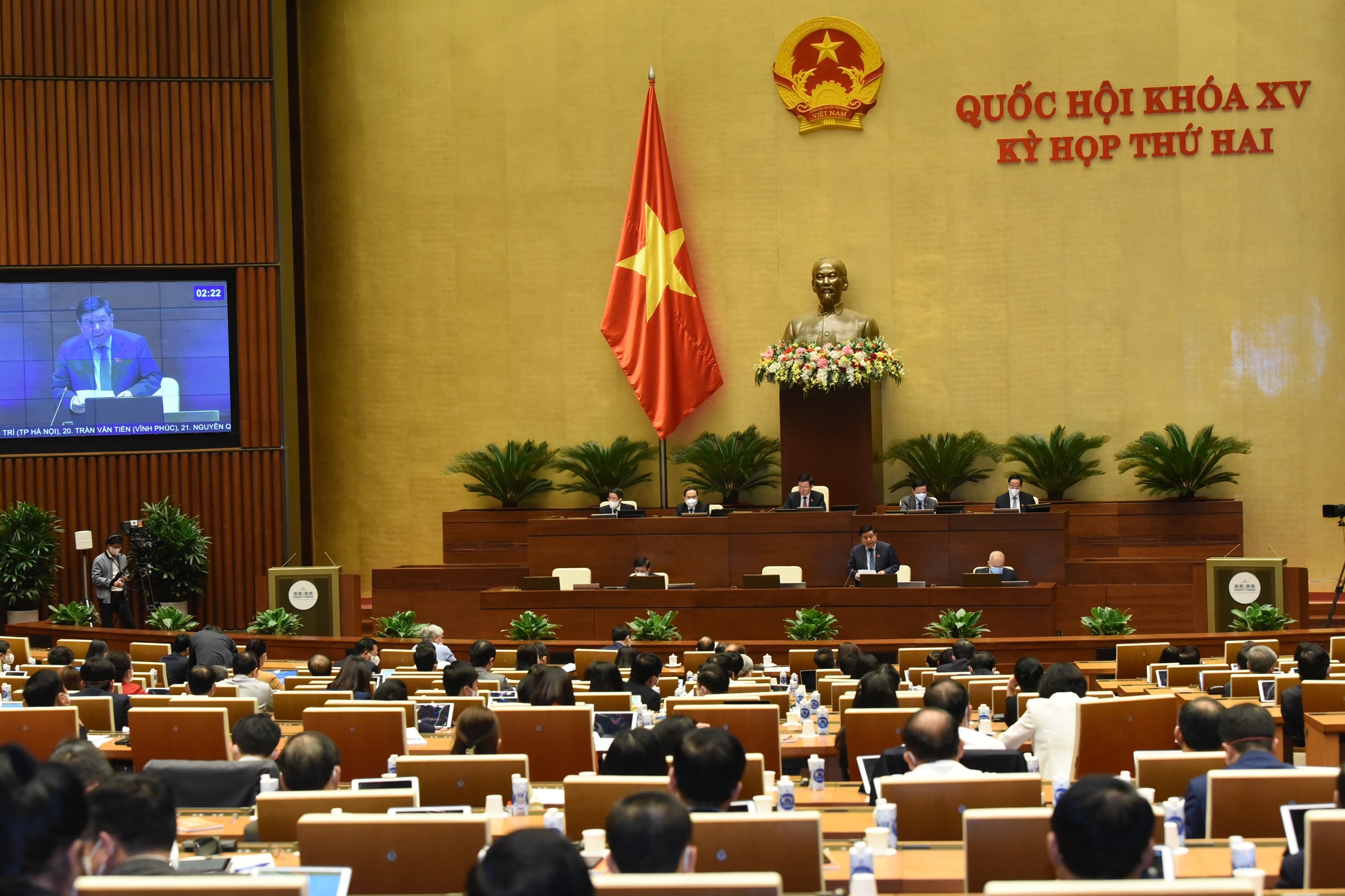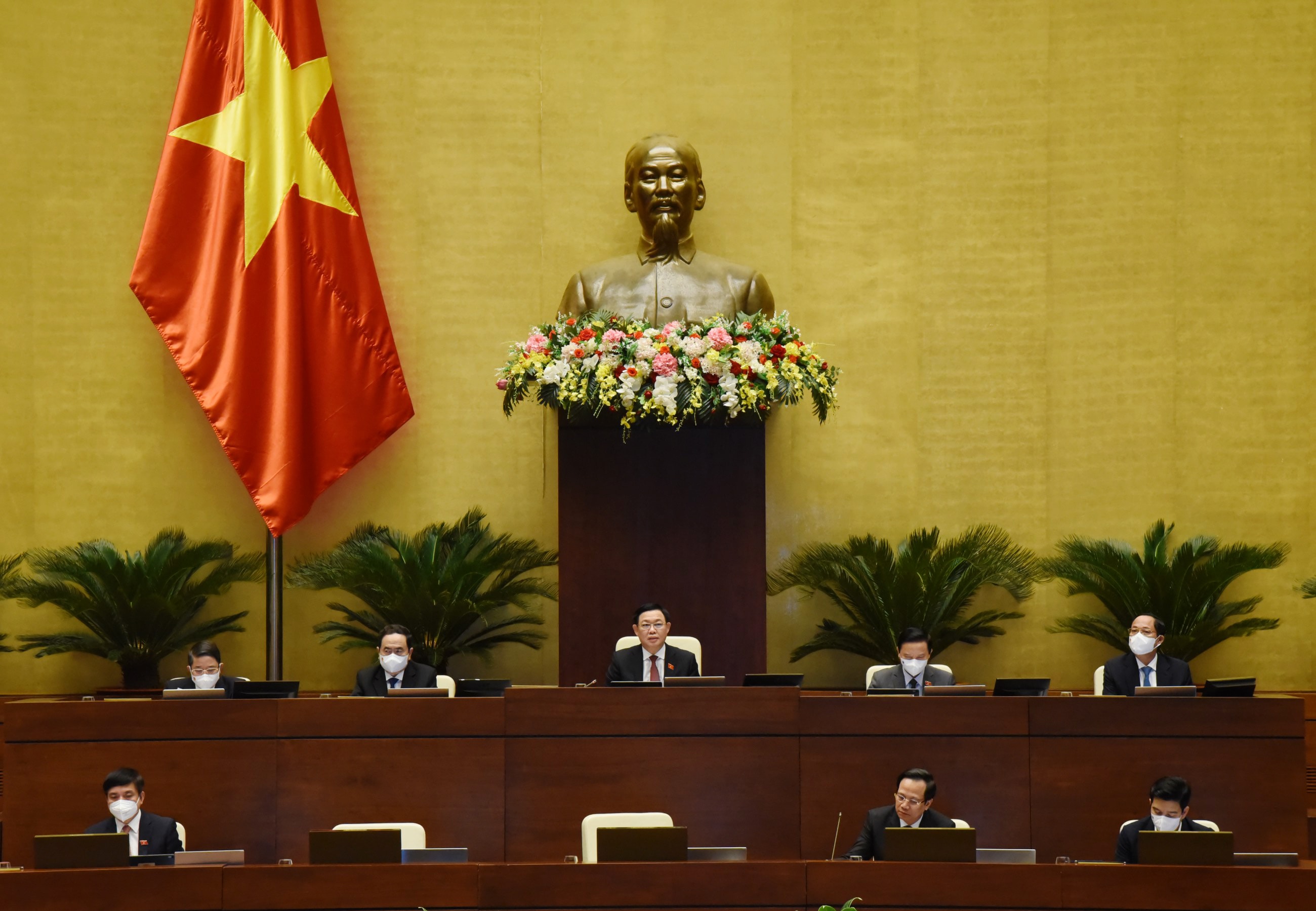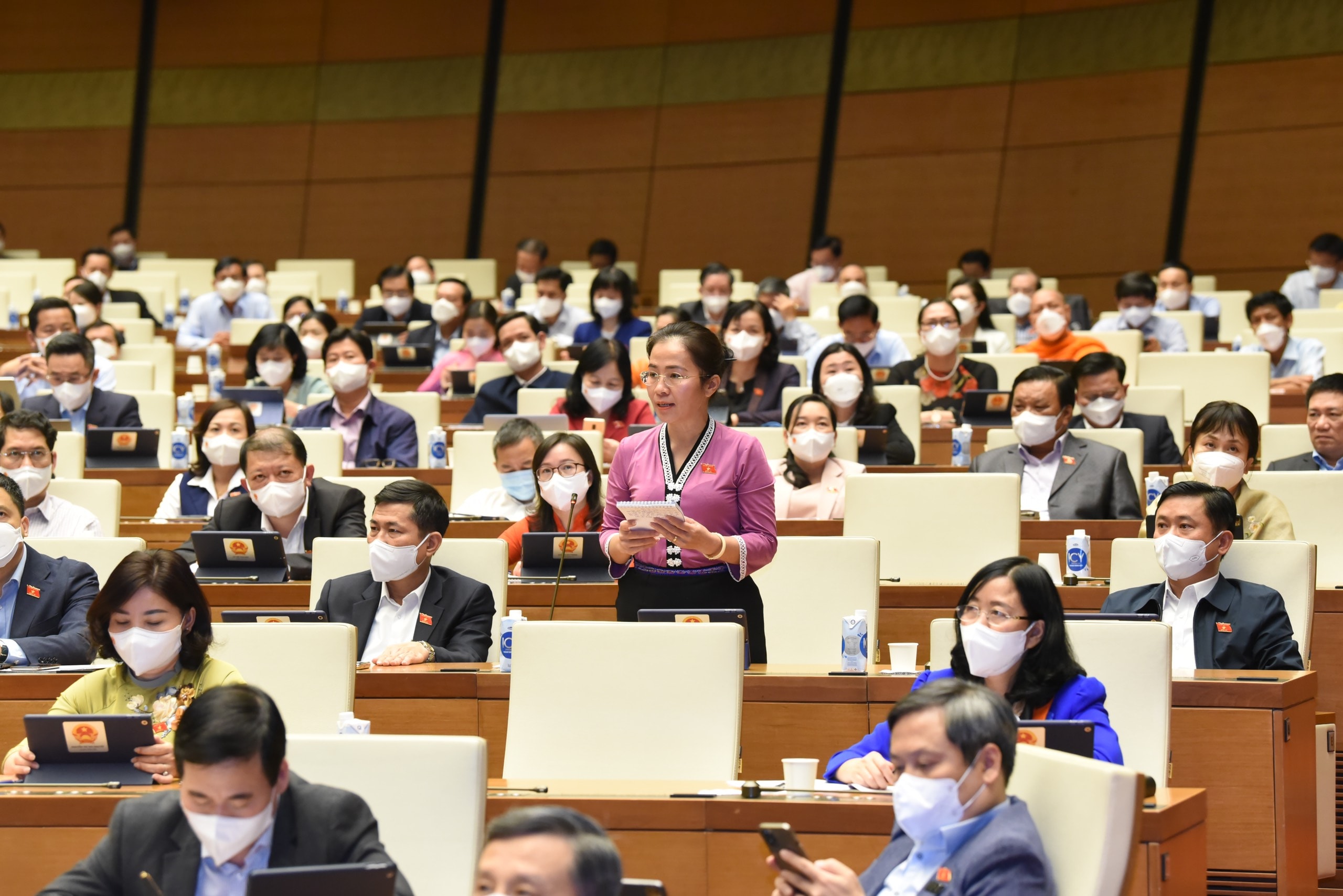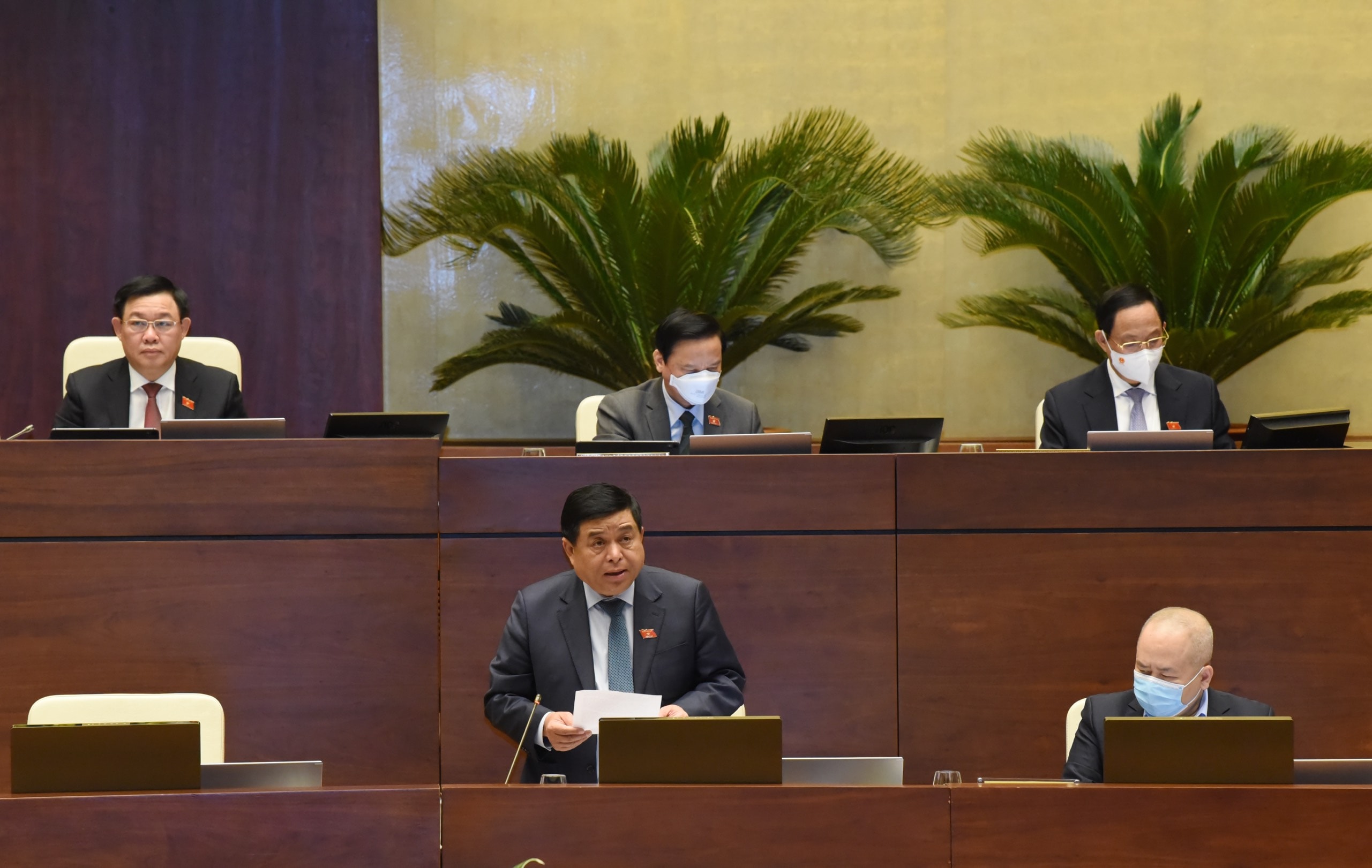National Assembly delegates from Nghe An province questioned Minister of Planning and Investment Nguyen Chi Dung.
(Baonghean.vn) - On the afternoon of November 11, under the direction of Comrade Vuong Dinh Hue - Politburo member, Chairman of the National Assembly, the National Assembly conducted questioning on the fourth group of issues in the field of planning and investment.
 |
| Panorama of the question and answer session at Dien Hong Hall, National Assembly House on the afternoon of November 11. Photo: Quang Khanh |
National Assembly deputies questioned Minister of Planning and Investment Nguyen Chi Dung on solutions to restore and develop the economy in the new context; solutions to support and remove difficulties for enterprises, cooperatives, and business households to restore and develop production and business.
Investment preparation work, allocation and assignment of the medium-term public investment capital plan for 2021-2025 and the 2021 plan; solutions to remove difficulties and obstacles, speed up the disbursement of public investment capital and key national projects; progress of implementation of programs and projects using ODA capital and preferential loans for development investment.
Speaking at the question and answer session, delegate Vo Thi Minh Sinh - Member of the Provincial Party Standing Committee, Chairwoman of the Vietnam Fatherland Front Committee of Nghe An province, delegate of the 15th National Assembly, assessed: The socio-economic situation of our country is facing many difficulties due to the impact of the Covid-19 pandemic.
 |
| National Assembly Chairman Vuong Dinh Hue chaired the discussion session. Photo: Quang Khanh. |
In that context, the delegate of Nghe An delegation requested the Minister of Planning and Investment, in his role as the "commander" of the general industry, to preside over and advise the Government on economic development, to inform him about the exact time when the economic recovery stimulus package will be implemented in the current conditions (if any) and how it will be similar and different from the support packages implemented in previous periods.
Delegate Vo Thi Minh Sinh also asked the head of the Ministry of Planning and Investment to determine when the Vietnamese economy can be considered to have recovered after the Covid-19 pandemic?
Responding to the question of the female delegate of Nghe An delegation, regarding the lessons learned after implementing investment stimulus packages to cope with the economic crisis in 2008 and 2009, is there any difference with the package under construction? Minister of Planning and Investment Nguyen Chi Dung assessed this as a very good question.
"We must learn from the experiences of the investment stimulus packages of 2008 and 2009 to build on the good things and avoid the shortcomings of the program at that time," said the Minister.
According to Minister Nguyen Chi Dung, at that time, the stimulus packages focused mainly on three biggest goals: promoting production, business and export; stimulating investment and consumption; and ensuring social security.
The size of the stimulus package at that time was 122,000 billion VND, equivalent to 6.9 billion USD; in 2009 alone, our country allocated 100.6 trillion VND, equivalent to 5.7 billion USD, or about 5.6% of GDP.
 |
| Delegate Vo Thi Minh Sinh, Nghe An delegation, gave a questioning speech. Photo: Quang Khanh |
The positive results achieved helped the country overcome the crisis and made Vietnam one of the few countries in the world with positive growth, with growth of 5.7% in 2008 and 5.4% in 2009.
However, according to the Minister, the limitation of the stimulus packages implemented in 2008 and 2009 was that the new policies mainly focused on the supply side and did not support businesses in accessing output, so after production was completed, they did not know where to sell it.
At that time, the mobilization interest rate was high but the implementation of the support policy was not synchronized with other monetary and fiscal policies, so it reduced the effectiveness, leading to policy exploitation. The support capital did not flow into production but mainly into securities and real estate.
On the other hand, due to loose control, it affected macroeconomic stability, inflation increased during this period, respectively 9.2% in 2010 and 18.6% in 2011.
The Minister of Planning and Investment said: Spreading out investment leads to debt, waste, and delay. Many projects stopped in 2011 and have not yet resolved the consequences. Many interest-supported packages have not yet been settled.
 |
| Minister of Planning and Investment Nguyen Chi Dung answers questions. Photo: Quang Khanh |
According to Minister Nguyen Chi Dung, the reasons are the lack of synchronization between fiscal and monetary policies, inflexible monetary policies; lack of strict management and supervision; policies implemented on the unstable macro-economy of the previous period; money supply and credit growth are always high; support policies are not close to reality; barriers and conditions for business loans are not public and transparent.
From the above achievements and limitations, Minister of Planning and Investment Nguyen Chi Dung emphasized the lesson that it is necessary to have a comprehensive program with a large enough scale and enough borrowing, repayment and absorption capacity of the economy.
Along with that, it must be implemented synchronously, effectively, promptly and must ensure stability; support must be focused, key, concentrating on a number of industries and fields with the ability to recover, supporting cash flow and financial stability, mobilizing other international resources...; especially, there must be risk control and close supervision during implementation.
Regarding the recovery time of our country's economy in the current period, it is said that up to now, in reality, there is no unified view on this issue, but in his opinion, Minister Nguyen Chi Dung shared that if it is called recovery, it means that economic activities, businesses, and people's travel must return to normal, and GDP growth rate must return to the growth rate as before the Covid-19 pandemic.
Emphasizing that the economic recovery process takes time, the Minister of Planning and Investment commented: If the stimulus packages start to be implemented from the beginning of 2022 and are well implemented in controlling the implementation efficiency, the recovery process will take place from the end of 2022 and by the end of 2023, it will be possible to return to normal as desired and hoped.
Earlier this afternoon, Minister of Education and Training Nguyen Kim Son and several related Government members continued to answer questions on a group of educational issues.

The National Assembly questioned Minister of Education and Training Nguyen Kim Son.
(Baonghean.vn) - On the morning of November 11, under the direction of Comrade Vuong Dinh Hue - Politburo member, Chairman of the National Assembly, the National Assembly conducted questioning on the third group of issues in the field of education and training.


